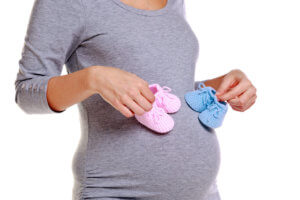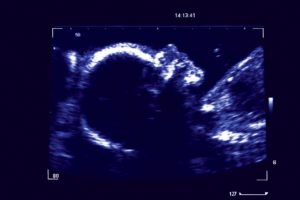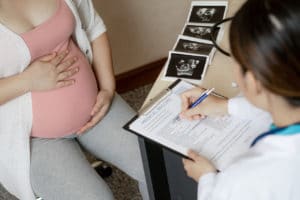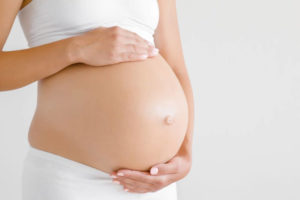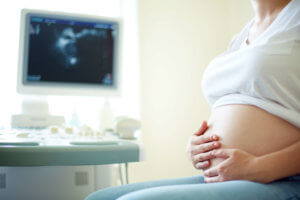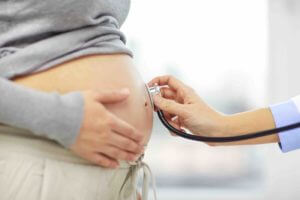First trimester screening is a voluntary examination considered by some expectant parents. However, this method is only a statistical assessment. What this examination actually says about the health of your baby and how necessary this method really is, you will find out in this article!
Table of contents
What is first trimester screening?
First trimester screening – also known as first trimester test or first trimester screening – is one of the non-invasive methods of prenatal diagnostics. However, this is only a rough assessment. Genetic diseases, malformations or chromosomal changes cannot be detected with absolute probability.
Accordingly, first trimester screening is not a diagnostic method, but only a statistical assessment.
What is examined during first trimester screening?
First trimester screening is divided into 2 parts: First, your doctor will take some blood. Then your baby will be examined by ultrasound. Your doctor will find the following values in your blood:
- PAPP-A: Pregnancy Associated Plasma Protein A. This is a product produced by the placenta.
- ß-hCG: human chorionic gonadotropin. This value is also known as the pregnancy hormone.
The ultrasound will also allow your doctor to perform other tests. However, these concern your baby:
- Fetal nuchal translucency
- Length of the fetal nasal bone
- Blood flow through the right heart valve
- Venous blood flow
A particularly important part of the first trimester screening is the neck fold measurement. Between the 10th and 14th week of gestation, it is common for some fluid to collect in your baby’s neck. This allows your doctor to measure whether there is a suspicion of possible chromosomal abnormalities, heart defects or other malformations.
Can the examination harm my baby?
Unlike invasive examinations, there is no risk of complications with first trimester screening. So you can be completely safe. These tests will not harm your baby in any way.
When should I consider first trimester screening?
As the name suggests, this type of screening refers to the first trimester of pregnancy. It is advisable to schedule the screening between the 10th and 14th week of pregnancy.
Your doctor will explain the entire examination to you, allay any fears you may have and answer any questions you may have about the first trimester screening procedure.
First trimester screening – what you should consider when making this decision
All tests included in the first trimester screening have the goal of identifying a risk for certain diseases and abnormalities.
As you already know, the test results do not provide absolute certainty, but only a purely static probability. Consequently, misdiagnoses often occur with this test.
Let’s let the numbers speak for themselves: Let’s assume that 100 women are examined by first trimester screening. In 96 women, findings are detected in their baby. However, further examinations then prove that the child has no chromosomal abnormalities and is completely healthy.
Accordingly, further tests are usually always needed to arrive at a comprehensive result. However, this also involves higher risks that affect you and your baby.
What can be detected with this method?
Chromosomal changes such as trisomy 21, 13 or 18 can be determined with a certain probability. The probability rate is therefore between 92 and 99 percent.
However, neither malformations nor developmental disorders nor blood, skeletal or muscle diseases can be detected by this method. Although these examinations reveal findings with a certain probability, here too there is no complete certainty.
Therefore, you should not let yourself be influenced too much by the test result. A finding does not necessarily mean that your baby is suffering from an impairment. False results are therefore not uncommon.
The consultation for first trimester screening also includes information about the so-called Praena test. This is a method that makes it possible to analyze the DNA of your baby in the mother’s blood.
In this way, indications can be found that may point to a chromosomal abnormality. Since this is also a non-invasive method, you do not need to worry about complications during the examination.
If your doctor does not find any abnormalities in your baby, this does not mean that your baby is perfectly healthy. Here, too, misdiagnoses can occur.
How do I deal with it if the values are abnormal?
If the first trimester screening does reveal findings that could indicate a disease, your doctor will probably advise you to have further tests.
First of all, the first trimester screening seems to give expectant parents the opportunity to make sure about the health status of their child.
However, there is also a risk of making decisions too quickly just because of a certain finding about your baby’s health. If this is the case, you and your partner should consult with each other. You can also get help from a doctor or a special counseling center.
First trimester screening – how useful is it really?
Whether or not first trimester screening is really useful is often debated among some experts. This is because most parents-to-be hope that this examination will provide them with the certainty that they are informed about their baby’s state of health.
However, as you already know, these examinations do not offer 100% certainty. It is possible to say with a certain probability that a disease is present. However, the test can also contain errors.
This is because first trimester screening is not a diagnostic method, but merely a statistical assessment. Accordingly, it can only determine how high the risk of a chromosomal abnormality or malformation is. There are no risks offered by this examination.
Sources:
https://www.netdoktor.de/schwangerschaft/ersttrimesterscreening/
https://www.familienplanung.de/schwangerschaft/praenataldiagnostik/risikoeinschaetzungen/

